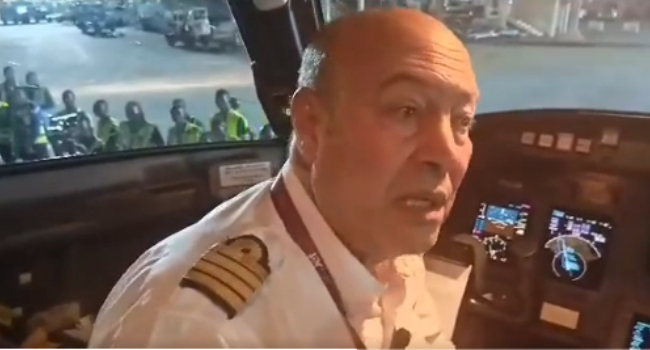The pilot who flew the Nigerian team has offered further clarification on the controversy involving the Nigerian and Libyan authorities over the alleged mistreatment of the Super Eagles. Tensions arose after the flight was unexpectedly diverted to Al-Abraq, a remote airport, instead of the intended destination, Benghazi.
The Nigerian Football Federation (NFF) claimed the diversion was deliberate, while the Libyan Football Federation (LFF) denied any wrongdoing, attributing the incident to logistical issues.
In a video interview shared by sports journalist Pooja Media on X, the pilot stressed that the decision to divert the flight was not his, but was made by Libyan authorities.

“The flight plan was to land at Benghazi, Benina, and we had approval from the Libyan Civil Aviation Authority to do so,” he explained.
“However, as we began our descent, they instructed us to divert to Al-Abraq, which is about 150 miles away, around 300 kilometres east. It wasn’t even listed as our alternate airport, which is concerning.”
The pilot expressed concerns about the safety risks, pointing out that fuel calculations were made for the original destination.
“In aviation, we plan our flights and calculate fuel for the intended destination. These sudden changes can pose safety risks,” he said, adding that he questioned the directive several times.
“When I requested to land in Benghazi as per the flight plan and authorisation, they refused, saying the order came from the highest authority, and we had to land in Al-Abraq.”
Dismissing media claims that the diversion was his decision, the pilot insisted, “Everything in aviation is documented. I asked them at least eight times, warning about potential fuel issues, but they insisted we divert to Al-Abraq.”
He emphasised that all communications and approvals are recorded and could be provided as evidence if necessary.
“The truth is, we were supposed to go to Benghazi, and I have proof of the approval. But at the last minute, they changed the plan and diverted us to another airport.”
Describing Al-Abraq as a poorly equipped domestic airport, the pilot highlighted the difficulties they faced during the landing.
“There was no ILS (Instrument Landing System), no air navigation approach, and no VOR (VHF Omnidirectional Range). We had to make a visual landing, which is especially challenging at night with poor weather conditions.”
The pilot noted that his previous experience in the region, having worked for two years with a Tunisian company, helped him manage the tricky landing. “It was a tough situation, but thankfully, we landed safely.”
In response to the incident, the Nigeria Football Federation announced that the Super Eagles would withdraw from their qualifier match against Libya. “The players have decided not to play, and NFF officials are arranging for the team’s return home,” the statement said.

